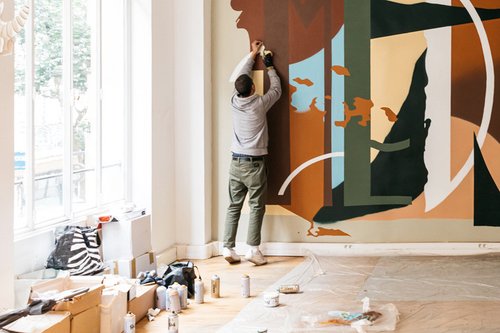Take a walk to boost your health and creativity
Apr 14, 2021
5 mins


Journaliste indépendante.
What do Beethoven, Aristotle, and Steve Jobs have in common? They all had the habit of walking for several hours a day. Now, what if that was the big secret of the best inventors and artists throughout history?
Since working from home has become common and commuting often unnecessary, many of us are getting much less exercise than before. (Just look at the unworn soles on our shoes.) And yet, walking has beneficial effects on our general health, especially for creativity and focus. The return of the warm weather is the ideal time to give your morale and your brain a boost. Let’s take a look at the benefits of walking on creativity and then some.
Convergent vs divergent thinking: the perfect match
“How many possible uses can you imagine for this tyre?” That is one of the questions students at Stanford University were asked by researchers Marily Oppezzo and Daniel Schwartz. Their goal? To study the impact of walking on divergent thinking the thought process used to generate creative ideas by exploring many possible solutions and creativity. The test subjects were divided into two groups: one group sat in a room while the other went for a walk around the campus. The result: the walkers performed 80-100% better than the sedentary ones.
To confirm whether these effects were really linked to physical activity or simply to being outdoors, the scientists repeated the experiment. This time, members of one group walked on treadmills in a small room. Members of the other group were pushed around in wheelchairs outside. Once again, the first group proved to be more creative. Is it really a huge leap to think that walking could turn you into a modern-day Charles Dickens?
The researchers also looked into the effect of convergent thinking, which is the ability to find one correct solution from different alternatives. Here, the students had to find the links between a series of words. This time, the sedentary ones did better than the walkers. The conclusion is clear: walking is particularly beneficial for creative thinking, and less suitable for reflective and analytical thinking.
Walking to think better
Various research studies point to another important benefit of walking when it comes to generating new ideas. This activity increases attention span. “When you walk in the countryside, you get away from the distractions of everyday life,” clinical psychologist Valérie Germain told Santé, a French health magazine. “Our attention is both greater and less scattered. The mere act of walking sharpens our concentration.”
The Max Planck Institute in Berlin agrees with this finding. Its researchers invited adults and children to take an attention test while either sitting at a desk or walking on a treadmill. The experiment consisted of listening to a series of numbers and indicating, for each number, whether they had already heard it four numbers earlier. Not surprisingly, the walking groups in all age groups performed better.
The fountain of youth for the brain
“Walking is man’s best medicine,” wrote Hippocrates. And since then, science has confirmed his insight. Walking keeps your brain young, beautiful, and muscular, worthy of being on the cover of Healthy Living magazine.
“It allows for better blood flow to the organs, muscles, and brain. But above all, it is a physiological activity, so it expends very little energy,” said Éric Becker Chagneux, a physiotherapist and high-level athlete. Walking sends pressure waves through the arteries and thus increases the blood supply to the brain. It encourages the dilation of blood vessels, naturally lowering blood pressure. And because it also encourages full and regular breathing, it oxygenates the brain, improving both concentration and memory. The icing on the cake is that it stimulates the production of endorphins and other well-being neurotransmitters, which work to reduce stress and improve mood. In short, we could say “a walk a day keeps the doctor away” just as readily as we do about an apple a day.
Tips for healthy and efficient walking
For all sedentary people, walking is essential if they want to stay healthy. “Over the past year, we have been seeing people who have had no problem going for a walk. Either because they are not comfortable at home, or because they aren’t going out anymore,” said Becker Chagneux. Here are some tips on how to get the most out of this activity.
Adjust your pace to your goal
Have you ever noticed that you drive or run faster when listening to AC/DC than Snoop Dogg? You are not alone. Psychologists have shown that uptempo music pushes you to speed up your body and your thoughts. So before a stressful interview or meeting, take a 15-minute walk around your office to calm your nerves. Conversely, if you need energy before an important presentation, get out and take a brisk walk to give yourself a boost.
Wear the right shoes
While it is perfectly possible to walk in heels or dress shoes, your body will thank you for choosing more appropriate footwear. “Basically, humans are designed to walk barefoot. So the more the shoe constrains the foot, the less physiological the walk. Ideally, you should opt for flexible shoes with a thin sole that conforms to the shape of the foot,” said Becker Chagneux.
Choose your path according to your needs
Attention is a limited resource, which is consumed as the day progresses. A walk in the city provides immediate stimulation and can be a form of excitement. “To wander is human, to stroll is Parisian,” wrote Victor Hugo in Les Misérables. On the other hand, an already over-stimulated brain will benefit more from the calm of the countryside or a green space such as a park.
Avoid stomping around
A warning to those of you who wander around in the open space with your phone to your ear: “It’s almost counterproductive. It’s not functional, it doesn’t activate the right muscles and it doesn’t have the benefits of an outdoor activity,” said Becker Chagneux. Going shopping on your lunch break doesn’t count for these purposes either.
Walk for at least 20 minutes
How much time should you spend walking? Professor Jo Barton of the University of Essex sought to answer this question. In a study of 1,252 participants, she found that the beneficial effects of outdoor activity, such as walking or gardening (although not as easy in the office), appeared after the first five minutes of being outside. But ideally, you should walk for at least 20 minutes. “For a sedentary worker, this is the minimum. Otherwise, we’ve observed harmful effects on the body,” said Becker Chagneux.
Make it something you’ll enjoy doing
“Generally speaking, an activity is never good if you have to force yourself to do it. If you are too tired, for example, it’s better to take a nap than to force yourself to walk. You can make up for it by taking a longer walk the next day,” said Becker Chagneux. And why not listen to a podcast or phone a friend to motivate yourself to move?
If walking seems to be the easiest way to relax, to be more creative or more focused, it can also be an original alternative to meetings. Co-walking (or the walk-and-talk) might foster more natural and constructive exchanges. Is this just another new fad straight from Silicon Valley? Not at all. Long before the start-up crowd was around, great philosophers such as Aristotle were already teaching while walking. This earned his school the term “peripatetic”, from the ancient Greek word for “one who likes to walk while talking”. We can all learn from that.
Translated by Kalin Linsberg
Photo: Welcome to the Jungle
Follow Welcome to the Jungle on Facebook, LinkedIn, and Instagram, and subscribe to our newsletter to get our latest articles every day!

More inspiration: Creativity

5 books to boost your creativity at work
Creativity at work is important, but sometimes we aren't inspired by our daily lives. We've curated a list of books to kickstart your creative mind!
Oct 04, 2023

How creativity became corporate religion
By idolizing the image of the feverishly driven artist, capitalism created new ways to exploit workers
Sep 05, 2023

Learn to boost your creativity (and let go of your fears)
No one is immune to the effects that negative feedback can have on their creativity. Danielle Krysa, the author of Your Inner Critic is a Big Jerk...
Feb 21, 2022

Costume drama: exploring the creative process with designer Lorna Mugan
She’s been nominated for a Bafta and an Emmy, but it’s unlikely you’ll recognise her face. Meet Lorna Mugan, a costume designer from Donegal.
Oct 12, 2020

In lockdown and running out of ideas? Six tips to stay creative
Whether it’s through creating art or just finding inventive ways to adapt at work to this strange time, being creative is a new survival skill.
May 12, 2020
The newsletter that does the job
Want to keep up with the latest articles? Twice a week you can receive stories, jobs, and tips in your inbox.

Looking for your next job?
Over 200,000 people have found a job with Welcome to the Jungle.
Explore jobs